Sorted by date Results 276 - 300 of 622
Every year since 1991 Fish Factor has selected “picks and pans” for Alaska’s seafood industry - a no-holds-barred look back at some of the year’s best and worst fishing highlights, and my choice for the biggest fish story of the year. Here are the 2019 picks and pans, in no particular order - Best fish scientist – Dr. Bob Foy, director of science and research at NOAA’s Alaska Fisheries Science Center/Juneau – No one explains science better or with more passion. Biggest new business potential: Mariculture. Alaska is acting on plans to grow a $10...

Governor Mike Dunleavy's administration released a proposed budget for FY 2021 on Dec. 11. Total revenues for the state of Alaska would be about $8.77 million, and expenditures at $10.18 million. A press release from the governor's office highlights a few items of interest with the budget, such as fully funding K-12 education and the court system, as well as providing for a full PFD payment. This new budget would also fund 15 new State Trooper positions, and increases general fund spending on...
As the House Representative for District 36, I’m writing to update you on some of the issues currently before the Alaska State Legislature. The 2019 legislative sessions were challenging – we continued to grapple with creating the budget, implementing a long term sustainable fiscal plan, and address declining revenue. While we were able to hold fast on funding for departments like Fish & Game and Education, the Marine Highway System faced unprecedented cuts. During the interim, I have been focused on re-establishing the AMHS link to Prince Rup...
Alaska’s 2019 salmon season was worth $657.6 million to fishermen, a 10% increase from the 2018 fishery. Sockeye salmon accounted for nearly 64% of the total value, topping $421 million, and 27% of the harvest at 55.2 million fish. Those are the lead takeaways in a summary from the Alaska Department of Fish and Game that reveals preliminary estimates of salmon harvests and values by region. The final values will be determined in 2020 after processors, buyers, and direct marketers submit their totals paid to fishermen. Pink salmon were the s...
October 23, 1919 The merchants of Wrangell have been busy the past week outfitting loggers and trappers. In view of the shortage in many American furs, as well as in certain of the foreign pelts, it is expected that the prices of fur this coming season will be higher than at any time in the history of the fur business. October 20, 1944 After seven years as superintendent of Wrangell Institute, George T. Barrett, accompanied by his wife and three children, left this week. Since coming to Wrangell, Barrett increased the enrollment from 50...
As more Alaskans eye the lucrative opportunities in growing kelp, many others are heading to beaches at Lower Cook Inlet to commercially harvest the detached bunches that wash ashore. That practice is now getting a closer look by state managers and scientists and could result in new regulations by year’s end. Detached kelp harvests have occurred at Lower Cook Inlet under special permits since the 1970s but matters of who needs permits, for how much and for what purposes are not clearly defined. Currently, a special permit is needed for c...
October 16, 1919 Almost the entire town turned out Sunday to witness the launching of Walter Waters’ new boat, Princess Pat, which took place from William Fletcher’s boat shop. The boat was shipped knocked down from the De Foe Company of Grand Rapids, Mich. The frame is of oak and the planking of cypress, while the cabins and pilot house are of Alaska cedar. The boat is fitted with the latest Pullman berths. It will probably be a month before the Princess Pat makes her maiden voyage. Mr. Waters will continue to operate the Glenora, and with two...
The nation’s farmers of the sea are hoping for a helping hand from Uncle Sam to train future generations of fishermen. It would mirror programs in place for nearly 160 years for U.S. farmers and ranchers. Federal backing of training programs for entry level farmers and ranchers can be traced back to the 1862 Morrill Land-Grants Act. Beginning in 2009, Congress authorized $75 million for the Beginning Farmer and Rancher Development Program (BFRDP) to “develop and offer education, training, outreach and mentoring programs to enhance the sus...
“Unpredictable” is the way salmon managers describe Alaska’s 2019 salmon season, with “very, very interesting” as an aside. The salmon fishery is near its end, and a statewide catch of nearly 200 million salmon is only six percent off what Alaska Dept. of Fish and Game number crunchers predicted, and it is on track to be the 8th largest since 1975. The brightest spot of the season was the strong returns of sockeye salmon which produced a catch of over 55 million fish, the largest since 1995 and the fifth consecutive year of harvests topping 5...
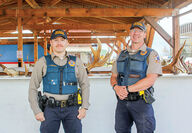
State Wildlife Troopers Kyle Freeberg, of Wrangell, and Cody Litster, of Petersburg, set up shop in Wrangell's downtown pavilion last Sunday afternoon with several hunting regulation handbooks and racks of moose antlers. As many eager hunters across Southeast Alaska are aware, moose season opens on Sept. 15. This is a registration moose hunt, Freeberg said, so anybody wanting to hunt moose will have to be registered with the Department of Fish and Game. The bag limit is one bull moose, and many...
Hunters are reminded of new waterfowl regulations which change the timing of season opening and closure dates on an alternating yearly schedule. These changes went into effect on July 1, 2019 in Region 1, which includes Units 1 through 4. Each year, the season opening date will change, depending on whether it is an odd year or even year. In odd years, like 2019, the season start date for waterfowl will begin on Sept. 1. In even years, like 2020, the season start date will begin on Sept. 16. Season duration will remain constant at 108 days. This...

In the past year, at least four citizens from Petersburg and Wrangell have sought and gained their U.S. citizenship to be with their families and for peace of mind. Elisa Teodori originates from Italy, but moved to Petersburg after she met her husband, Tor Benson, while working in Ecuador. Laura Davies first came to the US from Canada to work as a recreation therapist in Georgia, but eventually moved to Wrangell to take a job working with Alaska Crossings and met her husband. Gilda Barkfelt...
ANCHORAGE, Alaska (AP) – Add salmon to the list of species affected by Alaska’s blistering summer temperatures, including the hottest July on record. Dead salmon have shown up in river systems throughout Alaska, and the mortalities are probably connected to warm water or low river water levels, said Sam Rabung, director of commercial fisheries for the Alaska Department of Fish and Game. The department has not quantified past heat-related fish deaths because they tended to be sporadic and inconsistent, Rabung said. But department scientists this...
On Monday, August 19th, Governor Dunleavy released his full list of Special Session budget vetoes. The Alaska Legislature passed two special session budget bills in July with the primary intention of restoring the Governor’s original vetoes and protecting certain funding sources, such as the Higher Education Investment Fund and the Power Cost Equalization Fund. In the original budget passed in June (HB39), we included continued funding for the Senior Benefits Program, the University of Alaska, early learning programs, and the Alaska State Counc...
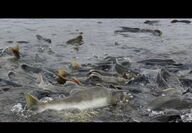
ANCHORAGE, Alaska (AP) – Biological oceanographer Sonia Batten experienced her lightbulb moment on the perils of too many salmon three years ago as she prepared a talk on the most important North Pacific seafood you'll never see on a plate zooplankton. Zooplanktons nourish everything from juvenile salmon to seabirds to giant whales. But as Batten examined 15 years of data collected by instruments on container ships near the Aleutian Islands, she noticed a trend: zooplankton was abundant in e...
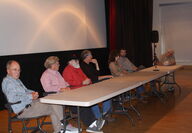
One of the central parts of the annual Bearfest celebration are the symposiums. Experts on bears and bear-related subjects are invited to come speak in Wrangell each year. This year saw several such speakers, including Lance Craighead who spoke on federal and state regulations on bear conservation, Harry Reynolds on the endangered subspecies of Gobi Desert brown bears, and John Nary on bear observation challenges at the Mendenhall Glacier. A roundtable discussion was held on Thursday, July 25,...
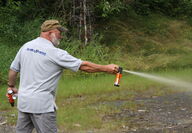
A bear safety workshop was held at the gun range on Spur Road last Wednesday, July 24, as one of the first events scheduled for Wrangell's annual Bearfest. Wrangell resident Robert Johnson led the workshop. He has had a lot of experiences with bears over the years, he said, and told everyone early in the workshop that having respect for bears was an important part of staying safe around them. "You just have to be in awe of these animals and show them the utmost respect," he said. "As long as...
July 31, 1919 Those who have had large caches of liquor which they are selling at enormous profits have no just claim for mercy. They are not in the same position as those saloon men who had on hand, when they were out of business, wet goods the possession of which was originally lawful. The latter bought their goods to sell according to the law and they would have gladly sold it before the clock marked the ending of legal liquor traffic in Alaska. There is a spirit of fair play that tells us that these men should have had an opportunity to...
As Alaska lawmakers continue their struggle to keep the state afloat, commercial fisheries dodged a bullet that would have removed millions of dollars from its budget. An obscure procedural action within the capital budget called a ‘reverse sweep’ prevents dozens of program-specific pots of money from being automatically drained into the budget reserve, as Governor Dunleavy aimed to do. “The sweep is money that is not spent in a single year. In this case, it comes from certain sources, such as test fish receipts, commercial crew licenses and s...
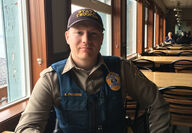
State Wildlife Trooper Kyle Freeberg moved to Wrangell back in April. As a state trooper, Freeberg's job includes patrolling old logging roads during the hunting season, and watching the commercial and sport fishing in Wrangell's waters. Of course, being the only trooper in Wrangell means he has a lot of ground to cover, literally and figuratively. As such, he said that he wants to increase the amount of collaboration between himself and the people of Wrangell. This is not only to help him do a...
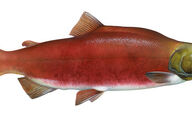
Wrangell District Ranger Clint Kolarich, under authority delegated by the Federal Subsistence Board, is closing the June 21 – July 31, 2019 Federal subsistence Sockeye Salmon fishery in the Stikine River. The closure will be effective Sunday, July 21, 2019 at 11:59 p.m. and will remain in effect through the rest of the 2019 season which ends July 31. The 2019 preseason forecast for the Stikine River is 90,000 Sockeye Salmon which is below the average 153,000 fish. The forecast includes 66,000 T...

The Alaska Department of Fish and Game announced July 22, nonresident anglers may not retain king salmon from August 1 through September 15 in Southeast Alaska and Yakutat marine waters, except in designated sport fish terminal hatchery areas in the vicinity of Juneau and Ketchikan. Resident king salmon regulations remain unchanged. This period of nonresident king salmon nonretention will be effective 12:01 a.m. Thursday, August 1, through 11:59 p.m. Sunday, September 15, 2019. The Southeast...

Sea otters are considered by many people to be an adorable animal, an important part of the ecosystem, and also a nuisance that is threatening other marine life populations in Southeast Alaska. In Wrangell, many people have talked about the need for better population control when it comes to otters. The Wrangell Borough Assembly talked about loosening restrictions on hunting the creatures last September with Sebastian O'Kelly, a federal lobbyist. Back in May, fifth-grade student Brody Knecht...
Fisheries fare better than most people in terms of Governor Mike Dunleavy’s budget cuts. Just under one million dollars was cut from the commercial fisheries division of the Alaska Department of Fish and Game, leaving it with an $85 million budget, half from state general funds. “To give the governor credit, he recognized the return on investment,” said Doug Vincent-Lang, ADF&G Commissioner. “It’s a theme I had all the way through the legislature that we take a $200 million budget of which about $50 million is unrestricted general funds and...
One fisheries item that appears to have escaped Governor Mike Dunleavy’s veto pen so far is his desire to divert local fish taxes from coastal communities into state coffers. Dunleavy’s initial budget in February aimed to repeal the sharing of fisheries business and landing taxes that towns and boroughs split 50/50 with the state. Instead, all of the tax revenues would go to the state’s general fund – a loss of $28 million in FY 2020 to fishing communities. “There is a recognition that these are viewed as shared resources, and they should be...